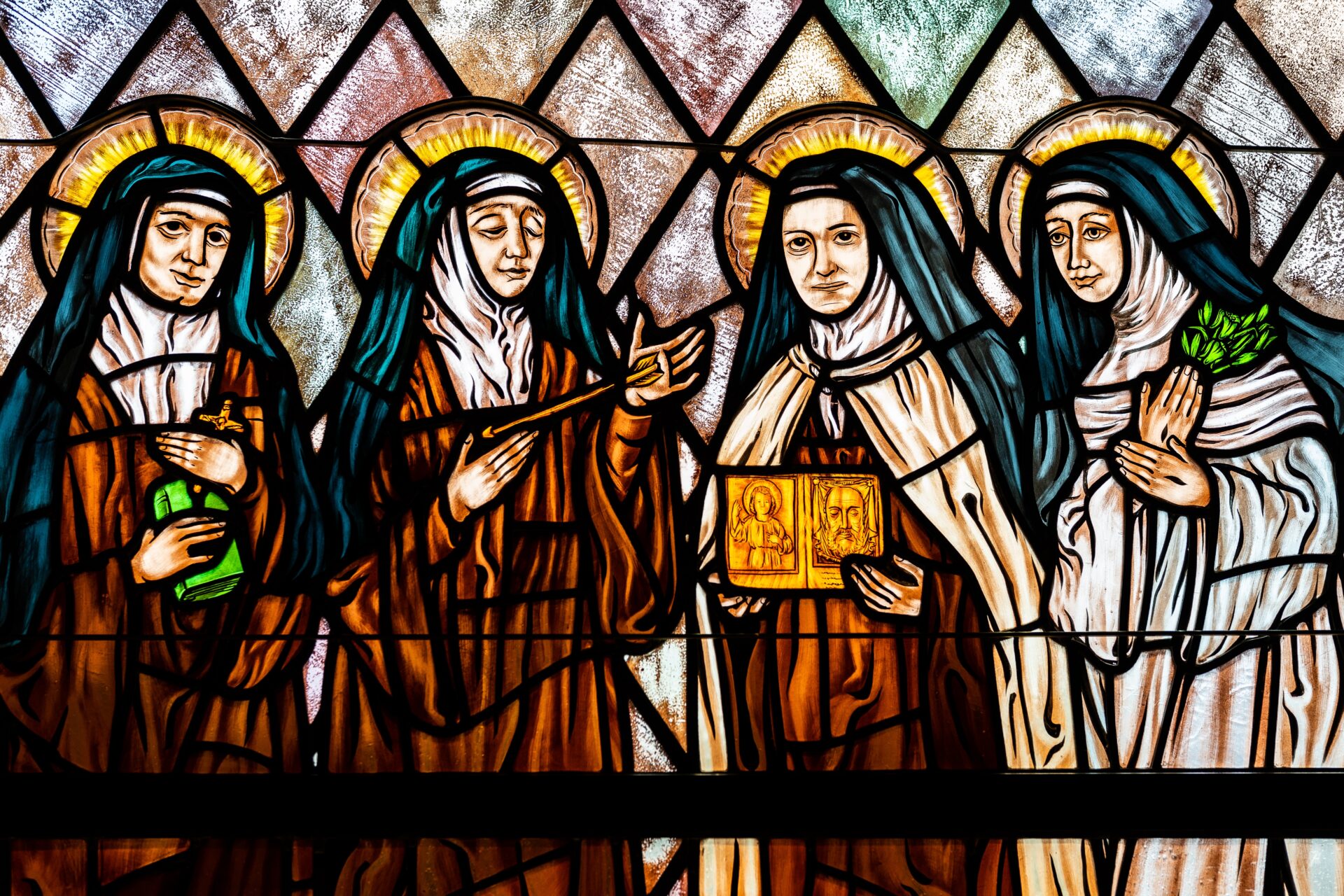
A stained glass window depicting four women Doctors of the Church: St. Teresa Benedicta, St. Teresa of Avila, St. Therese of Lisieux, and St. Catherine of Sienna at St. Therese of Lisieux R.C. Church in Montauk, NY
Photo by Nick Castelli on Unsplash
Saintly ways: reading the lives of the saints today
The word “saint” is often met with skepticism by the Protestant Christian. We tend not to have much trust in stories of miracles and processes of beatification. We will point to the term in the New Testament (for example, Ephesians 4:12 or 1 Peter 1:15-16), and often we leave the further need for ecclesial infrastructure aside.
Nonetheless, we have hope for living a witness faithfully to the Gospel. And we aspire to recognize and honor those known to us who provided inspiration through their lives and the stories we treasure of their exemplary lives following the Exemplar Jesus Christ.
In short, all Christians have saints, for how else would the Church have made it so far without such witness and willingness to live the faith out, despite the challenges and for some, persecution and the threat (sometimes fulfilled) of death for one’s convictions.
Roman Catholics and Protestants alike benefit from being in dialogue, from sharing our stories with one another. For we enrich our understanding of what God is doing in the world and that the Spirit of God never ceases in empowering the faithful, especially in times of crisis and challenge.
In his 2021 Orbis Books publication Saints Celebrated and Unsung: The Universal Call to Holiness, Roman Catholic priest Fr. James J. Bacik writes of saints, following the writings of Pope Francis I. He has prior books on Francis, published by Paulist Press.
Bacik notes he “is inspired by the 2018 apostolic exhortation of Pope Francis, Gaudete et Exultate (‘On the Call to Holiness in Today’s World’), which the pope intended not as a theological treatise on holiness but as a modest effort ‘to repropose the call to holiness in a practical way for our own time, with all its risks, challenges, and opportunities…’”[i]
Bacik arranges his chapters around the five sections of the 2018 apostolic exhortation: The Call to Holiness; Subtle Enemies of Holiness; the Light of the Master; Signs of Holiness in Today’s World; and Vigilance and Discernment.
Roman Catholics and Protestants alike benefit from being in dialogue, from sharing our stories with one another. For we enrich our understanding of what God is doing in the world and that the Spirit of God never ceases in empowering the faithful, especially in times of crisis and challenge. Yet stories of saints need to be read with care, lest in our telling, we are reinforcing uncritical readings of those stories that valorize issues of gender, power, and beliefs or practices best left in the distant past.
Bacik is eager to build upon the Pope’s work, observing “In this exhortation, Francis functions as a wise spiritual guide, offering acute analyses of human existence and solid practical advice for all Christians seeking to live the gospel.”[ii]
In each chapter, Bacik shared relevant highlights from Pope Francis, connecting each section to a specific saint (a mix of Roman Catholic and Protestant figures) as well as the “unsung” saints that he has known through his faith journey and work as a priest.
These “celebrated and unsung” saints allow the reader to enter into well-known stories (St. Augustine and Martin Luther King, Jr.) while also demonstrating saintly lives in the midst of parishes and communities by those who may be still in the midst of life, working at keeping their faith commitments.
One point of concern: in framing the lives of the saints, there can be an imbalance in telling the faithful narrative and dealing with the shadow side, or quite human parts of the saint that we must acknowledge, lest it slide into hagiography or validate a perspective that we might value without appropriate realization of the optics of the story in the long run.
In his section on St. Augustine, Bacik writes that “a wife who realizes she has endured a psychologically abusive marriage far too long may benefit from waiting a few more weeks or months to gather herself and develop an effective strategy before confronting her husband with a demand that they see a marriage counselor together.”[iii]
I have great concern over this example, given the better path to encourage a person in an abusive situation to get out of that environment and seek support when at a safer place. While Bacik is lifting up a particular story to illustrate fortitude, surely a component of saints, this particular passage gives me some distress as a reader.
Stories of saints need to be read with care, lest in our telling, we are reinforcing uncritical readings of those stories that valorize issues of gender, power, and beliefs or practices best left in the distant past.
Rev. Jerrod H. Hugenot is associate executive minister, American Baptist Churches of New York State.
The views expressed are those of the author and not necessarily those of American Baptist Home Mission Societies.



